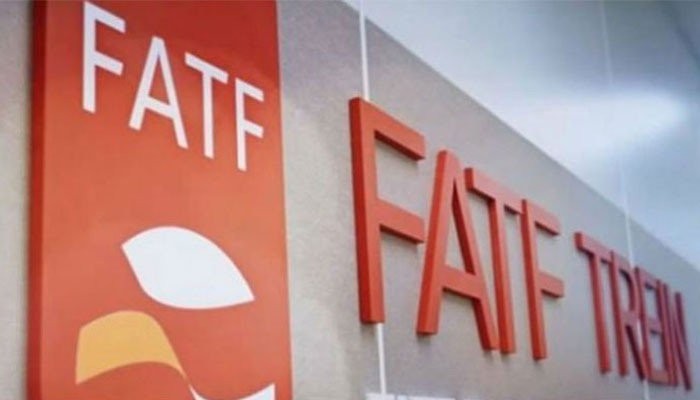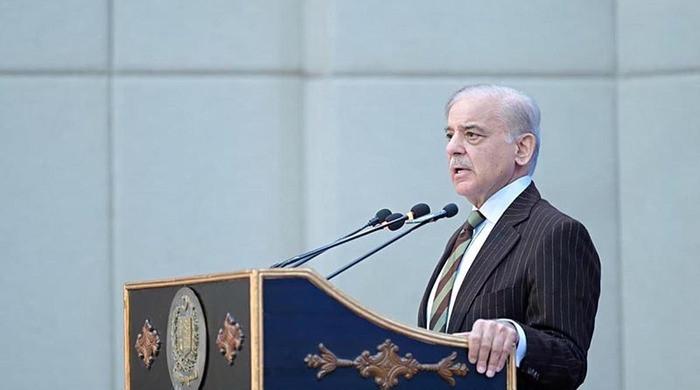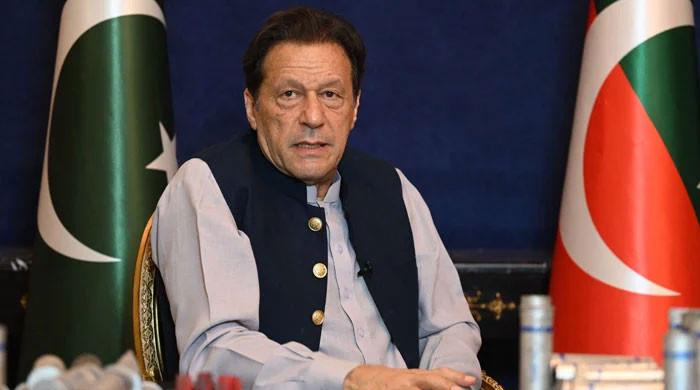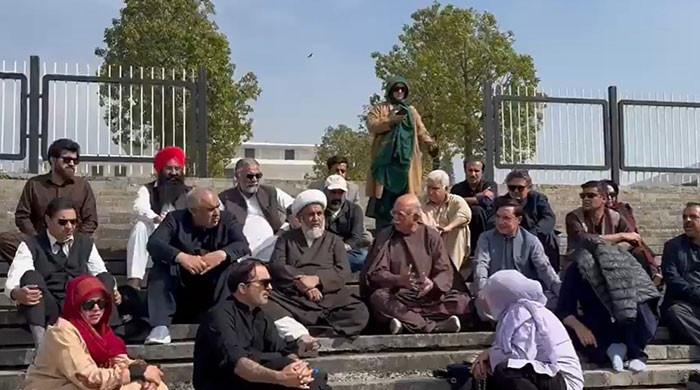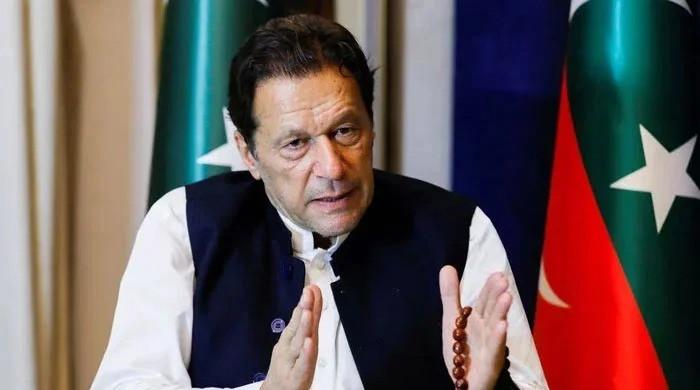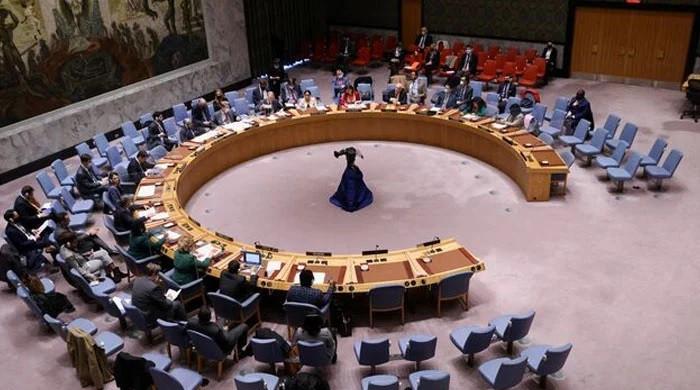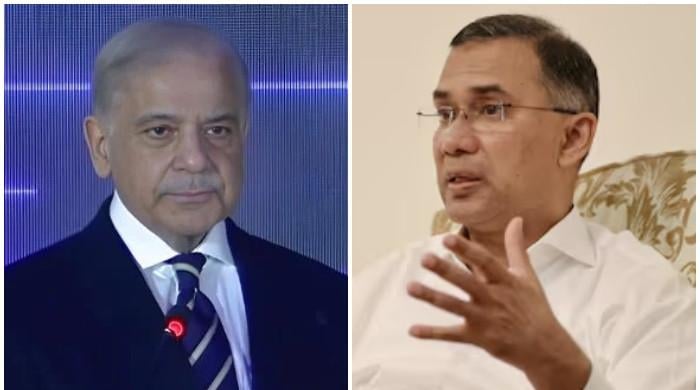Pakistani officials brief FATF's APG delegation on action against outlawed groups: sources
NACTA officials brief the delegates on charity laws being made in all provinces, sources say
March 27, 2019
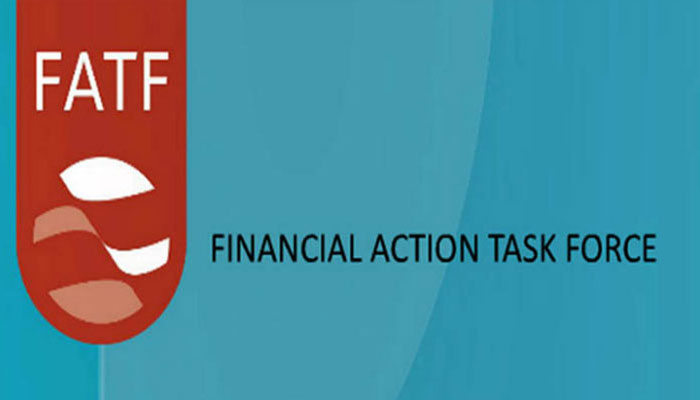
ISLAMABAD: Pakistani officials on Wednesday briefed a delegation of Financial Action Task Force's (FATF) Asia Pacific Group on the measures Islamabad had taken against proscribed organisations, sources informed Geo News.
Officials from the Ministry of Interior and law enforcement gave the briefing to visiting delegates, according to sources, apprising them of the mechanism of declaring such groups outlawed and clamping them down.
The delegates were also briefed about suspicious activities of different organisations and money laundering, the sources said.
They said that officials of the Ministry of Foreign Affairs also briefed APG delegation on implementation of United Nations Security Council (UNSC) resolutions.
During the second day's talks on Wednesday, the sources said, the Securities and Exchange Commission of Pakistan (SECP) officials informed the meeting about formulating an anti-money laundering system in non-profit organisations.
They said the delegates were also apprised of the anti-money laundering system and a campaign to generate awareness with regard to UNSC restrictions.
National Counter Terrorism Authority (NACTA) officials briefed the delegates on modern charity law, the sources added. The officials informed that legislation pertaining to charity was being made in all provinces of the country.
According to sources, the nine-member APG delegation led by Executive Secretary Garden Hook has been reviewing the implementation of 40 recommendations by the watchdog and the laws to prevent money laundering at the federal, provincial and district levels.
Pakistan has until May to ensure implementation of the measures, the sources added.
The visiting assessment team, which arrived in Islamabad on Monday for three-day talks, comprises Ian Collins of New Scotland Yard, James Prussing of Department of the Treasury United States, Ashraf Abdulla of Financial Intelligence Unit Maldives, Boby Wahyu Hernawan of Indonesia's Ministry of Finance, Gong Jingyan of People's Bank of China; Mustafa Necmeddin of Turkey's Ministry of Justice, Deputy Director Muhammad Al-Rashdan and Deputy Director Shannon Rutherford.
The APG assessment team is discussing the second draft of Mutual Evaluation Report (MER) with the relevant stakeholders. The team is also meeting officials from the Ministry of Finance, the State Bank of Pakistan, Securities and Exchange Commission of Pakistan and Federal Investigation Agency.
If Pakistan fails to satisfy the FATF delegation to remove its name from the "grey list", then a new plan of action can be given to the country.
In February, FATF directed Pakistan to take more steps to curb money laundering.
In June last year, Pakistan made a commitment to work with the FATF and APG to strengthen its AML/CFT regime and to address its terrorism financing-related deficiencies by implementing an action plan to accomplish these objectives.
FATF, a global body that combats terror financing and money laundering, had taken the decision to place Pakistan on its 'grey list' during a plenary meeting in February 2018.
Pakistan was formally added to the 'grey list' of countries involved in providing monetary assistance to terrorism and related causes after a June 2018 meeting of FATF in Paris.
The country was also included in the list from 2012 to 2015.
FATF objectives for Pakistan
1) Demonstrating that terrorist financing risks are properly identified, assessed, and that supervision is applied on a risk-sensitive basis
2) Demonstrating that remedial actions and sanctions are applied in cases of AML/CFT violations, and that these actions have an effect on AML/CFT compliance by financial institutions
3) Demonstrating that competent authorities are cooperating and taking action to identify and take enforcement action against illegal money or value transfer services (MVTS)
4) Demonstrating that authorities are identifying cash couriers and enforcing controls on illicit movement of currency and understanding the risk of cash couriers being used for terrorist financing
5) Improving inter-agency coordination, including between provincial and federal authorities, on combating terrorist financing risks
6) Demonstrating that law enforcement agencies (LEAs) are identifying and investigating the widest range of terrorist financing activity and that terrorist financing investigations and prosecutions target designated persons and entities, and persons and entities acting on behalf or at the direction of the designated persons or entities
7) Demonstrating that terrorist financing prosecutions result in effective, proportionate and dissuasive sanctions and enhancing the capacity and support for prosecutors and the judiciary
8) Demonstrating effective implementation of targeted financial sanctions against all 1267 and 1373 designated terrorists and those acting for or on their behalf, including preventing the raising and moving of funds, identifying and freezing assets (movable and immovable), and prohibiting access to funds and financial services
9) Demonstrating enforcement against targeted financial sanctions violations including administrative and criminal penalties and provincial and federal authorities cooperating on enforcement cases
10) Demonstrating that facilities and services owned or controlled by designated persons are deprived of their resources and the usage of the resources
